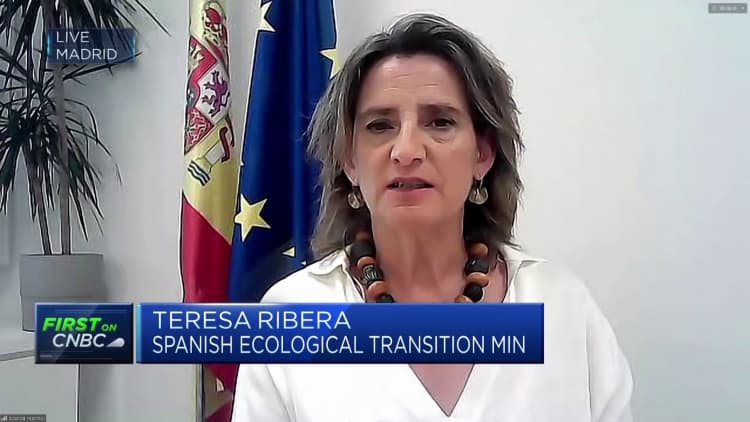
A banner showing an image representing Alberto Nuñez Feijoo, leader of the PP. Voters in Spain head to the polls on July 23 to vote and elect Spain’s next government.
Pablo Blazquez Dominguez Getty Images News | Getty Images
Spanish voters head to the polls on Sunday in an election that could bring the far right to power for the first time since the dictatorship of Francisco Franco.
Polls published before the vote projected a conservative victory, with the PP (People’s Party) poised to get around 34% of support, which would not be enough to form a majority government.
Some political analysts expect the PP to join forces with the far-right party Vox, which could be the third political force in this election and get more than 10% of the vote.
“The most likely outcome is a coalition government with the PP firmly at the helm and in control of most key ministries, and Vox as a junior partner,” Eurasia Group senior analyst Federico Santi said in a note on Wednesday.
He added that this scenario “would be moderately positive for the market, as reflected in Spanish asset prices in recent weeks, with a modest improvement in Spanish equity indices compared to their European parents, while the sovereign credit spread over Germany has remained virtually stable.”
It’s not the first time
The conservative PP party and the far-right Vox have previously made political deals to govern in three of Spain’s regional authorities and other deals in smaller cities.
However, their relationship seems more like a forced cohabitation than a natural couple.
An advertising billboard for the far-right party VOX is defaced with black paint during the election campaign.
Pablo Blazquez Dominguez Getty Images News | Getty Images
In a televised debate before the elections, the leader of the PP, Alberto Feijóo, indicated that he would govern with Vox, if he needed their votes. Members of the Conservative party have expressed concern about Vox’s anti-LGBT rights and anti-immigration policies.
Vox has also been criticized by mainstream politicians for opposing abortion rights and denying climate change, among other measures.
When he debated incumbent Socialist leader Pedro Sánchez, Feijóo said his rival could not lecture other politicians about pacts. Sánchez made agreements with separatist parties to achieve a working parliamentary majority.
It’s the culture wars
Tacho Rufino, an economist at the University of Seville, told CNBC’s Charlotte Reed on Thursday that this election is less about economic than cultural issues, such as nationalism, LGBT rights and climate change.
For his part, Sánchez has been criticized for pardoning politicians who support regional independence, for example. During his tenure, there have also been problems with the “yes only means yes” sexual consent law, which reduced the execution time of many convicted rapists through a loophole.
Sunday’s vote may also be affected by climate change, as it is the first election to take place during the summer. Spain is one of the southern European nations that has suffered a major heat wave in recent days.
[ad_2]
Source link





